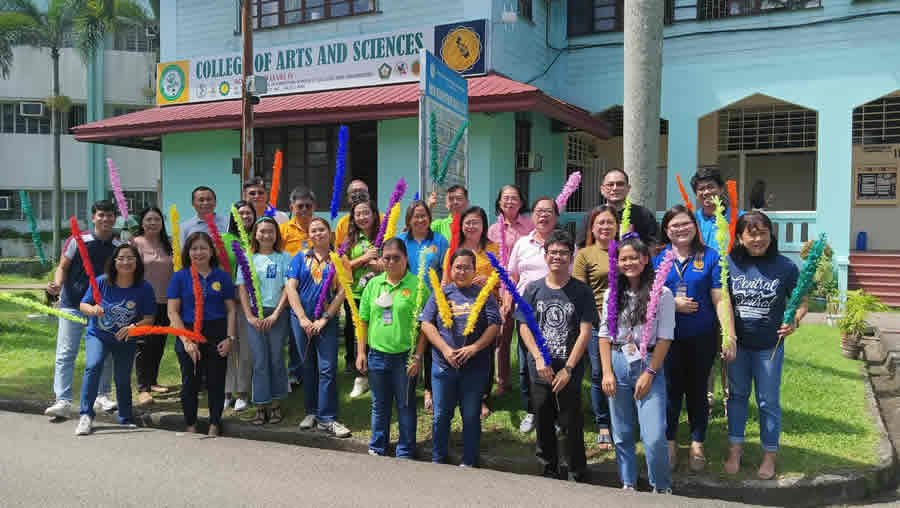By Mikee Natinga Norico
Celebrating the dedicated faculty members of CAS, who uphold the values of honesty, dedication and academic rigor.
CPU College of Arts and Sciences stands as a beacon of interdisciplinary education, fostering future leaders through a blend of rigorous academic programs and community-oriented values. Dr. Stella G. Fernandez, Jr., the esteemed Dean of CAS, shares insights into why incoming Centralian freshmen should consider CAS as their academic sanctuary and outlines the transformative opportunities awaiting them.
CAS offers a rich tapestry of programs, each designed to open doors to numerous professional avenues. Graduates in psychology can find roles in human resources or clinical psychology and may further their education with master’s degrees or medical courses. Chemistry graduates, after passing their board exams, can join various industries, pursue higher education, or become chemical technicians. Biology graduates have versatile options ranging from teaching and medicine to law and advanced studies. Social work graduates are highly sought after by the Department of Social Welfare and Development, often engaging in both professional and volunteer roles. Although temporarily closed due to lack of qualified faculty, the BS Political Science and BA Communication programs traditionally prepare students for careers in law, journalism, and media.
What sets CAS apart is its unwavering commitment to discipline and integrity. Emphasizing the importance of nurturing students’ talents to make them trustworthy and reliable professionals. The college’s comprehensive assessment and outcome-based education (OBE) ensures that students excel not only in theoretical knowledge but also in practical applications, preparing them for real-world challenges.
“Centralians are known for their honesty and dedication,” Dr. Fernandez said.
CAS employs a continuous assessment model to maintain academic rigor. This includes aligning curricula with industry standards, conducting teacher evaluations, and fostering an environment where students can provide honest feedback. The OBE curriculum emphasizes both theoretical and practical learning, ensuring students are well-rounded and prepared for their future careers.
Despite some challenges, CAS strives to provide ample resources for its students. The library is well-stocked, catering to the diverse reading needs of the students. However, there is a notable shortage in laboratory facilities for biology students, which has delayed some research and thesis work. Efforts are being made to address these issues, with ongoing construction of new laboratories and temporary use of the University Research and Development Center.
Dr. Fernandez highlights the structured support system for student internships and job placements. The college has organized various OJT (On-the-Job Training) programs, ensuring students gain practical experience relevant to their fields. Efforts are being made to streamline these programs, particularly in psychology and biology, where demand for internships is high. While the College itself does not offer specific scholarships, it channels students through the university’s centralized scholarship and work-study programs. These initiatives aim to support students both academically and personally, ensuring they have the resources needed to succeed.
Maintaining strong connections with alumni is a priority for CAS. The college is home to various alumni groups specific to each program, though a more unified CAS Alumni Association is envisioned for the future. This association aims to foster a cohesive network that can contribute back to the college, particularly as CAS approaches its 100th anniversary.
Looking ahead, Dr. Fernandez’s vision includes reviving closed programs by bolstering faculty development and encouraging more educators to join CAS. Strengthening the Alumni Association and maintaining high educational standards are also key goals. The college aims for exceptional board exam pass rates, aspiring for a 100% success rate.
Challenges such as lack of qualified faculty and limited research facilities are being actively addressed through faculty development programs and community extension services. The commitment to continuous improvement is evident as the college works towards reopening programs and enhancing research capabilities.
The CPU College of Arts and Sciences provides quality education, fostering integrity, and preparing students for diverse career paths. Under Dr. Fernandez’s leadership, CAS is poised to overcome its challenges and continue its legacy of excellence, shaping the future one student at a time.
For students who wish to enroll in said programs, the CPU College Aptitude Test (CPUCAT) is now open for admissions. For more information, kindly access this link: https://cpu.edu.ph/announcements_event/cpu-college-aptitude-test-cpucat-for-incoming-freshmen-for-sy-2024-2025/.

